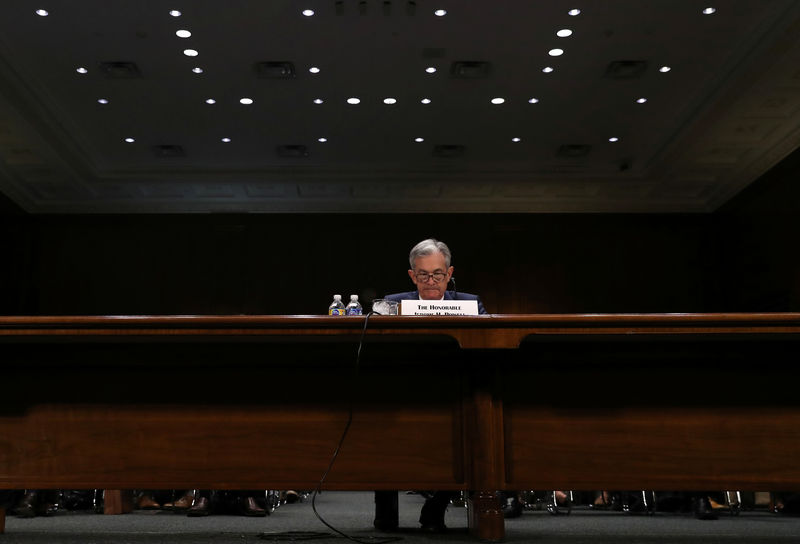(Reuters) - Federal Reserve Chair Jerome Powell indicated again on Thursday that an interest rate cut from the U.S. central bank is likely at its next meeting later this month as businesses slow investment due to trade disputes and a global growth slowdown.
In the second day of semi-annual testimony on Capitol Hill, Powell did not veer from the line he took a day earlier before the House Financial Services Committee, when he pledged the Fed would "act as appropriate" to defend the economy. That appearance served to cement financial market expectations for benchmark lending rates to be lowered at the conclusion of the Federal Open Market Committee's July 30-31 meeting.
This time addressing members of the Senate Banking Committee, Powell repeated his litany that three main risks threaten what is now a record-long U.S. economic expansion: trade uncertainty, slowing growth abroad and stubbornly low inflation.
The economy remains generally in "a good place," he said, and consumer spending remains robust. But the uncertainty stirred by the Trump administration's multi-fronted trade disputes is weighing on the outlook.
"Business are beginning to hold back on investment, for example," Powell said in response to a question from Sen. Tim Scott, a South Carolina Republican. "We see business investment having weakened after having been quite strong in '17 and most of '18."
"Business investment is critical. It has really slowed down here, and one of the reasons is uncertainty around trade and global growth," Powell continued.
"I think many of my colleagues on the FOMC have come to the view that a somewhat more accommodative monetary policy may be appropriate," Powell said.
Powell held his ground that soft inflation, which has persistently failed to rise to the Fed's 2% target, presents a significant risk the Fed must guard against.
Earlier on Thursday, the government reported that underlying consumer price inflation ticked up at its briskest pace in nearly a year and a half last month and the labor market shows no signs of weakening.
The Fed, however, tracks a different measure of price pressures, and that has drifted well below target.
Financial markets took Powell's two days of congressional testimony as a signal that when policymakers next gather in about three weeks, the Fed would cut rates for the first time since the financial crisis.
The Fed's policy rate is currently in a range of 2.25-2.50%, and the bank's last rate increase occurred in December, a hike that has been fiercely criticized by President Donald Trump. Financial futures markets indicate a 100% certainty among investors and traders that the Fed will lower that rate by at least a quarter percentage point this month.
FACEBOOK'S LIBRA
For a second day, Powell responded to lawmakers' concerns about Facebook Inc .'s (O:FB) proposed new crypto currency Libra, and he pledged the Fed would vigorously review the proposal in collaboration with other global financial regulators.
Powell said he expects Libra to be a main topic of discussion next week when finance ministers and central bankers from the Group of Seven nations meet in France.
Libra was unveiled by Facebook last month along with plans orchestrated by the social media giant for a parallel payments system to facilitate transactions.
Powell repeated his stance from a day earlier before the House Financial Services Committee that given Facebook's size, the company's plan for its own crypto currency and payments system requires the highest level of scrutiny by global financial regulators with a focus on such issues as privacy, money laundering and Facebook's massive global reach.
"The potential scale of this, given the size of Facebook's network, means it could be essentially immediately systemically important, and I think the company's acknowledged that," Powell said.
While the Fed does not want to stand in the way of financial innovation, Powell said a top concern is there appears to be no obvious regulatory agency in place to take the lead in oversight of the project.
"It isn't obvious at all from our current regulatory system that we have in place what we need to assess and provide oversight over this, and I expect we'll be working hard on this," Powell said.

The process is likely to take more than a year, he said.